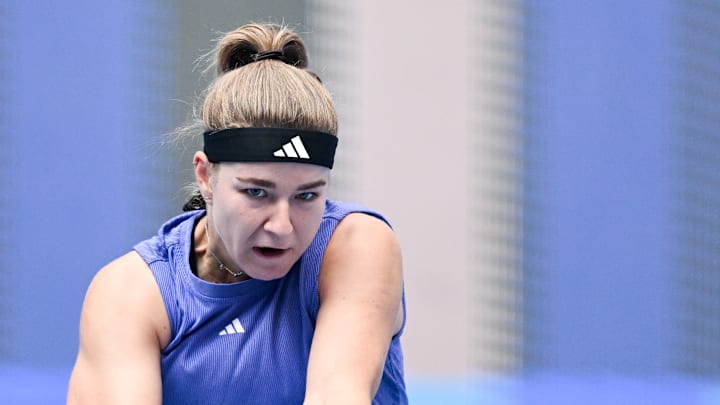Iga Swiatek and Aryna Sabalenka understandably receive much attention as the top two players on the WTA Tour. However, the China Open has demonstrated how much depth exists in the women's game. Sabalenka may have had the perfect reaction to a great shot against Karolina Muchova in their China Open quarterfinal, but it was the Czech who prevailed in three sets.
Muchova's superb triumph against Sabalenka set up a semifinal against the home favorite Qinwen Zheng at the China Open. The pair met a few months ago in the Palermo Open final on clay, which Zheng won in three sets.
That proved to be the ideal preparation for Zheng securing a gold medal at the Olympics at Roland-Garros. Can Muchova get her revenge in Beijing? Here are three pivotal elements of this matchup.
Being very precise with first serve placement
Both players are very good servers. Zheng probably has a slight edge in that department, but Muchova is not far behind. The moderately slow conditions in Beijing mean it is challenging to dominate on first serve, though. For instance, Muchova and Sabalenka both won more points on second serve during their quarterfinal.
Muchova and Badosa will need to consistently hit close to the lines to get free points on serve. It might be worth taking additional risks on first serve since taking a bit of pace off might make the ball sit up perfectly for the returner. The lack of pace in the court means a slow second serve could be harder to attack than a medium-pace first delivery.
Muchova not allowing herself to get pushed back in the court
Zheng's Palermo Open final triumph over Muchova was a tight battle. The most decisive factor that swung the match in Zheng's favor was how she routinely used her heavy topspin forehand to push Muchova behind the baseline. Zheng won most rallies when she got the Czech in that position.
The good news for Muchova is adopting that tactic will not be as easy for Zheng in Beijing. Palermo's hot and humid weather on a clay court made the balls bounce highly and at a decent pace. The balls are not jumping as high on the medium-slow hardcourts at the China Open, giving Muchova a better chance of staying up on the baseline consistently.
Muchova choosing the right moments to use her variety and net play
The slow conditions in Beijing are not optimal for coming to the net and using the drop shot. However, Muchova is as good as anyone in those areas, meaning she can overcome that issue. She also possesses a tennis IQ that helps her choose the right moments to use her variety. Last year's French Open runner-up did not come to the net too often against Sabalenka, but she often caught the Belarusian out when she did.
Zheng's style is not identical to Sabalenka's, but they can both be devastating when they get into a rhythm from the baseline. Muchova's craftiness stopped Sabalenka from finding that for most of the match, and she will seek to do the same in the semifinal. There could be a lot of cat and mouse in the rallies since, despite her power, Zheng is comfortable playing lengthy rallies if necessary.
